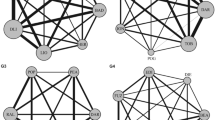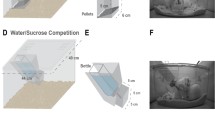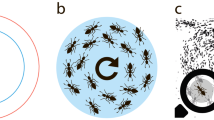Abstract
IN general, animals which are kept together form habits of responding to each other which are mostly regular and predictable. Part of the growing interest in the social behaviour of humans and animals is to discover more about the nature of these patterns of responding and the extent to which they vary between different types of animal, in order to build up some sort of “complete picture”. Despite the potential usefulness of social experiments in the laboratory with all kinds of animals, the lower vertebrates show only rudimentary capacities for social organization. It is not then surprising that relatively little work has been done on small mammals such as the rat, because rats do not appear to be especially influenced by each other's behaviour. Where there have been experiments designed to study social behaviour in the rat they have been mainly concerned with dominance and aggression; gregariousness; social facilitation; competition and co-operation. Many of these appear to have been designed specifically to test, in an “all or none” fashion, the existence or non-existence of social psychological concepts assumed to be appropriate to a variety of animals, and in particular to the higher primates including man. Studies of co-operation1 and “altruism”2 provide examples of this thinking. The question arises as to how much this sort of experimentation has tended to over-emphasize assumed behavioural similarities between animals, rather than using situations thought to be flexible enough also to demonstrate important behavioural differences. One way of attempting to counterbalance this possible limitation is to use well tried techniques previously free from social psychological considerations, and to employ groups of animals in them instead of individuals. With this consideration in mind we have now completed a series of thirty pilot studies in which the social organization of the rat was investigated. Our work is based on a report of Mowrer3 in which he described a situation which involves groups of rats in a “social problem”—that is, animals were trained to feed themselves by pressing a lever. When groups of three trained rats were placed in the apparatus together, hierarchies of performance emerged. One animal (of each group) did most of the work, the other two most of the eating! Additionally, the solution was said to persist indefinitely. Apart from the obvious fascination of this as a situation, the investigation of group situations using instrumental conditioning techniques seemed a neglected yet potentially fruitful source of material on the interaction of individual behaviour patterns.
This is a preview of subscription content, access via your institution
Access options
Subscribe to this journal
Receive 51 print issues and online access
$199.00 per year
only $3.90 per issue
Buy this article
- Purchase on Springer Link
- Instant access to full article PDF
Prices may be subject to local taxes which are calculated during checkout
Similar content being viewed by others
References
Daniel, W. J., J. Comp. Psychol., 34, 361 (1942).
Rice, G. E., and Gainer, P., J. Comp. Physiol. Psychol., 55, 123 (1962).
Mowrer, O. H., Trans. N.Y. Acad. Sci., 3, 8 (1940).
Author information
Authors and Affiliations
Rights and permissions
About this article
Cite this article
OLDFIELD-BOX, H. Social Organization of Rats in a “Social Problem” Situation. Nature 213, 533–534 (1967). https://doi.org/10.1038/213533a0
Issue Date:
DOI: https://doi.org/10.1038/213533a0
This article is cited by
-
Domestic dogs (Canis familiaris) coordinate their actions in a problem-solving task
Animal Cognition (2013)
-
Selfish strategies develop in social problem situations in chimpanzee (Pan troglodytes) mother–infant pairs
Animal Cognition (2009)
-
The behavior of worker and non-worker rats under the influence of (?) ?9-trans-tetrahydrocannabinol, chlorpromazine and amylobarbitone
Psychopharmacologia (1972)
Comments
By submitting a comment you agree to abide by our Terms and Community Guidelines. If you find something abusive or that does not comply with our terms or guidelines please flag it as inappropriate.



